Workplace well-being was quite rightly a hot topic for IT professionals and for IT service management (ITSM) in particular during 2019. Where the pressurized IT service desk work environment is an obvious area for concern, but well-being issues can affect all of us no matter our ITSM role.
Then the COVID-19 crisis happened. IT departments were under pressure to quickly serve and support the employees who became homeworkers overnight. Plus, for many IT employees, homeworking also became the norm.
Check out the results of the @ITSM_tools 2020 well-being in #ITSM survey – which also look at how the COVID-19 pandemic has made an impact on our mental health. #wellbeing #mentalhealth Click To TweetWith this and the potential well-being impact in mind, we ran another anonymous ITSM.tools “Well-being in ITSM” survey. This survey revisited the five questions in our 2019 well-being survey – to enable us to see if there were any changes – plus we added in some new questions related to the crisis and its impact on ITSM personnel.
Please keep reading to find out what our survey results said.
The 2020 results in summary
For those of you who are short of time, the key findings are that:
- 76% of survey respondents think that working in IT is going to get harder in the next three years (at least for some roles). With only 18% thinking not. This compares to 86% and 9% respectively in 2019 – so it’s technically both bad and good news.
- 23% of the survey sample feel that their personal efforts aren’t recognized (versus 35% in 2019), and another 53% state that it sometimes happens but not enough (versus 48% in 2019). So a total of 76% survey respondents feel undervalued in their jobs. Leaving only 23% of respondents that feel valued – which is up from last year. Again, it’s technically both bad and good news.
- A massive 39% of respondents feel that their personal efforts were recognized during the COVID-19 crisis. Interestingly though, 29% feel that their efforts weren’t recognized – meaning that the positive increase (versus the above) is in the main likely to have come from respondents whose efforts were previously only sometimes recognized (27% versus the 53% reported above).
- 52% of survey respondents state that working in IT has adversely affected their well-being to some extent, significantly down from 71% in the 2019 survey. 9% considerably (versus 21% in 2019). It looks like a move in the right direction, but this still needs to be a cause for concern at close to every tenth employee.
- 69% of survey respondents state that the COVID-19 crisis adversely affected their well-being to some extent. 20% considerably. This was the reason for rerunning this survey. It definitely needs a more detailed analysis, and – interestingly – these figures are remarkably close to the 2019 survey values.
- 45% of survey respondents feel that their immediate manager is not suitably skilled to identify and deal with employee well-being issues. This is 2% up on 2019. Another 29% think that they’re only partially skilled, a drop of 3% versus 2019. Worryingly, the total – 74% – is three-quarters of line managers.
- 24% of survey respondents feel that their employer doesn’t have suitable mechanisms for preventing and helping with employee well-being issues. This is an improvement – down from 37% in 2019. Another 44% think that they need improving, which is up 10% from 2019. Which is just over two-thirds of companies with potential “failings.”
- Only 3% of survey respondents didn’t work at home during the COVID-19 crisis.
- 20% of survey respondents prefer working in the office. 60% prefer home working, although just over a third of these need to return to office-based working. 17% have no preference either way.
Please keep on reading to find out what has changed for better and worse in more detail…
Q1. Do you think working in corporate IT will get harder over the next three years?
The results are shown in the graph below.
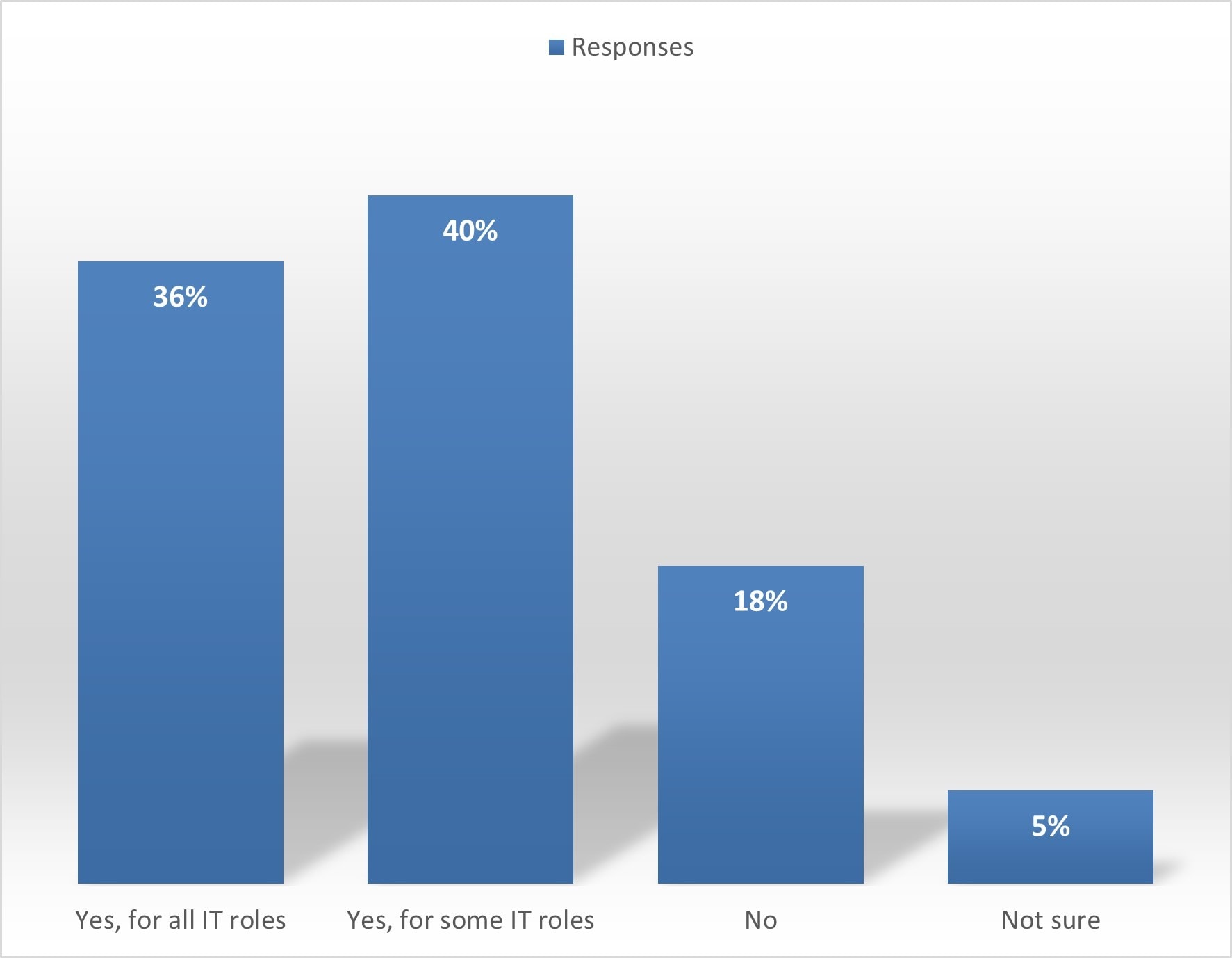
The survey found that 76% of survey respondents think that working in IT is going to get harder (at least for some roles). With only 18% thinking not. This compares to 86% and 9% respectively in the 2019 survey. It’s moved in the right direction but we’re still looking at an ITSM workforce that’s expecting things to get worse for those “working in IT.”
76% of @ITSM_tools survey respondents think that working in IT is going to get harder (at least for some roles) in the coming years. Get more insights here. #wellbeing #ITSM Click To TweetQ2. Do you feel your personal efforts, and your value to the business, are sufficiently recognized by management?
The results are shown in the graph below.
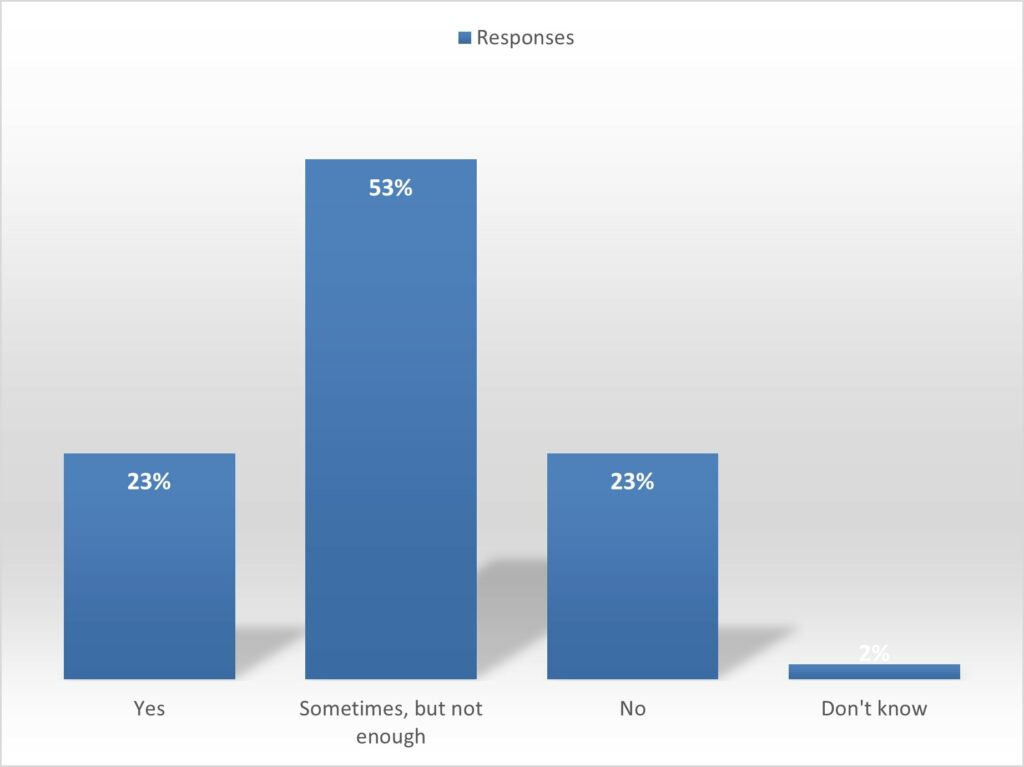
23% of the survey sample feel their personal efforts aren’t recognized by management, and another 53% state that recognition sometimes happens but not enough – a total of 76%. Whereas 23% of respondents can be assumed to feel valued.
@ITSM_tools well-being in ITSM survey finds that 76% of survey respondents feel undervalued in their jobs. #ITSM #wellbeing Click To TweetIt’s not a great view of working in IT, but it’s marginally better than the findings of the 2019 survey where the percentages were 35%, 48%, 83%, and 17% respectively.
Q3. Did you feel your personal efforts were sufficiently recognized by management during the COVID-19 crisis?
This was a new question for the 2020 survey. The results are shown in the graph below.
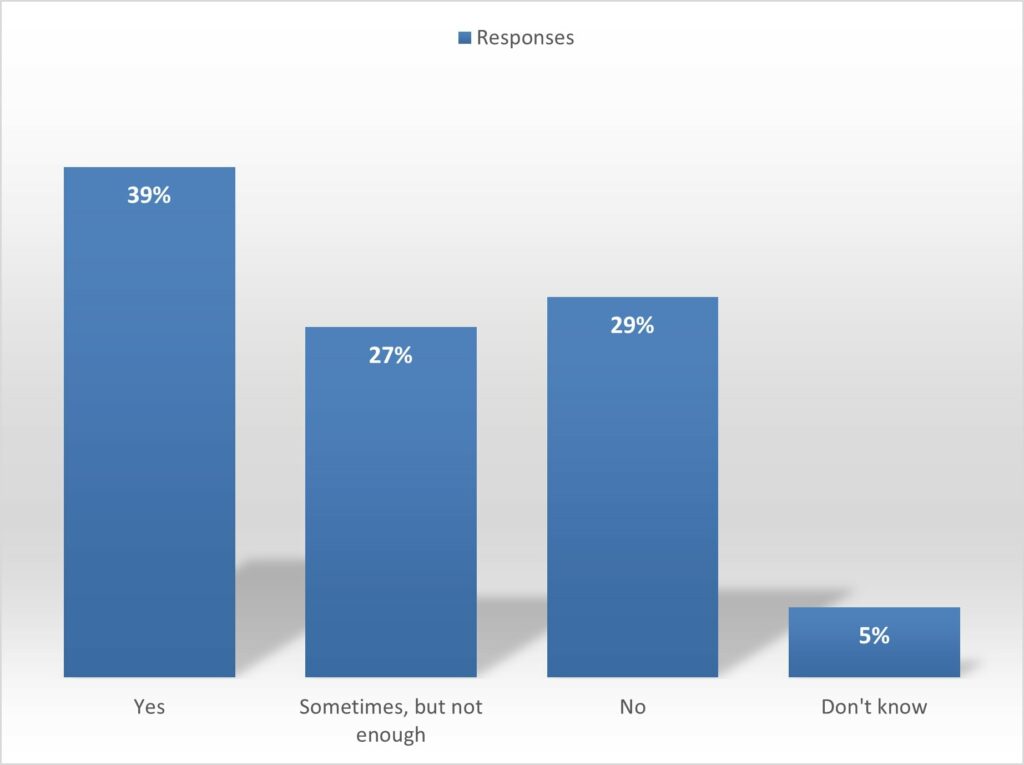
29% of the survey sample felt their personal efforts weren’t recognized during the height of the crisis, and another 27% state that recognition sometimes happened but not enough – a total of 56%. Whereas 39% of respondents felt valued. When these figures are compared to those in question two above, there’s no doubt that ITSM staff felt far more valued during the crisis than at other times.
The question is – why can’t this always be the case? Surely, we don’t need to be in a crisis-response mode to value the work of IT professionals. Of course, these statistics could reflect the fact that plaudits for IT and its people were more forthcoming from other parts of the organization during this period. Especially thanks to the role IT played in migrating employees to homeworking “overnight.”
Q4. Do you feel that working in IT is adversely affecting your personal well-being?
The results are shown in the graph below.
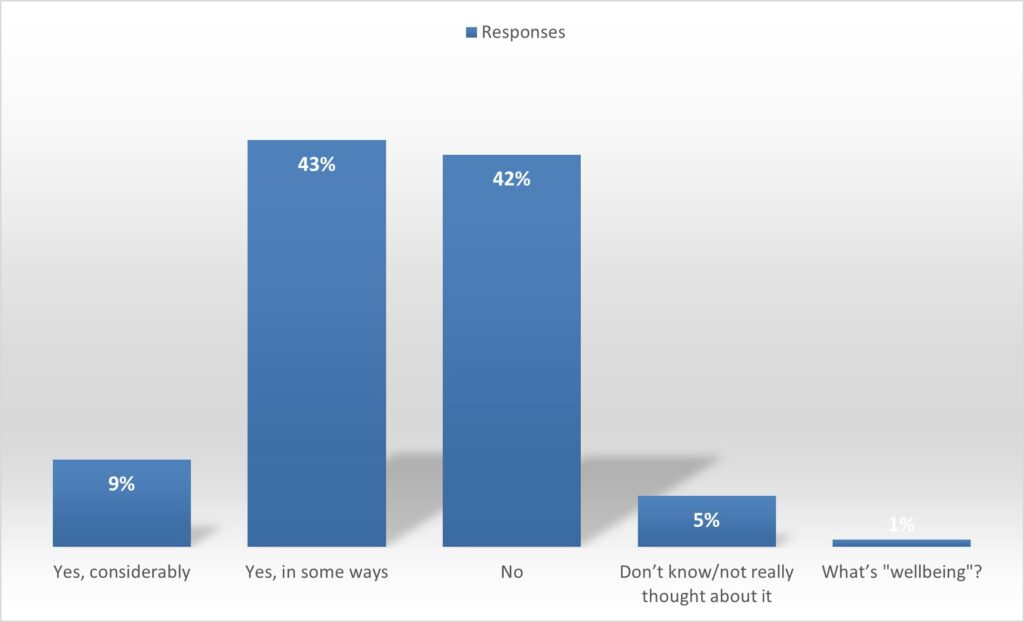
52% of survey respondents state that working in IT has adversely affected their well-being to some extent – this is a big drop in the right direction versus the 72% total in 2019. Whereas 42% have experienced no issues, up from 28%.
Half the people working in #ITSM roles have suffered from some form of well-being-related issues – @StephenMann #Wellbeing #MentalHealth Click To TweetIt’s a great improvement on last year. However, it still means that half the people working in ITSM roles have suffered from some form of well-being-related issues. Which is a pretty scary statistic to reflect on. It also needs to be viewed in conjunction with the findings of question five up next.
Q5. Do you feel that the COVID-19 crisis has adversely affected your personal well-being?
This was another new question for this year’s survey. Please bear in mind that the causes of the results being different from those in question four could be varied. A later article will try to better understand these using correlations between different questions.
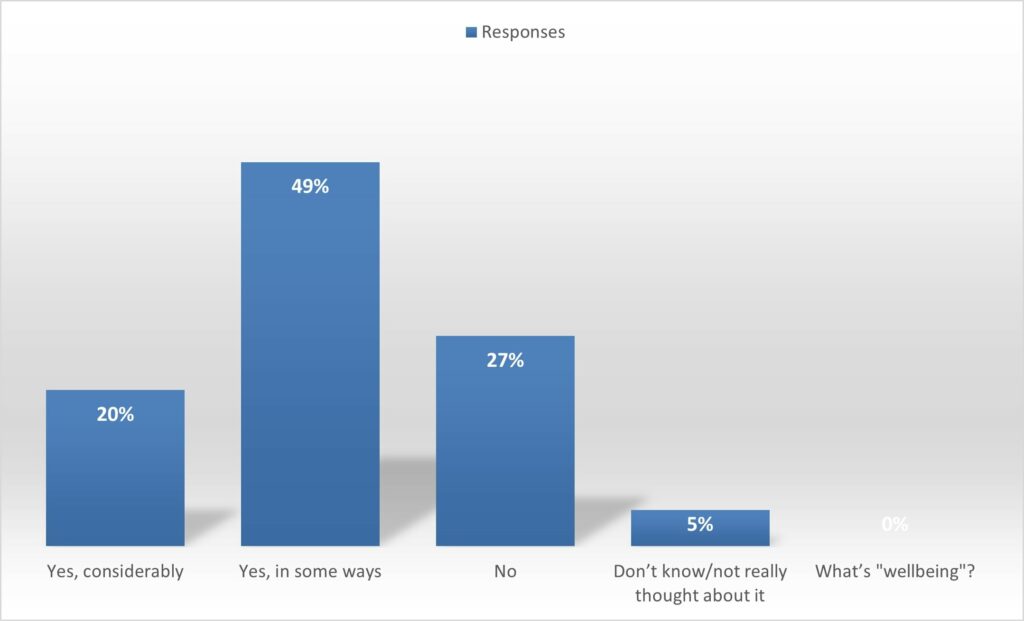
The above graph shows that 69% of survey respondents state that the COVID-19 crisis adversely affected their well-being to some extent, with 20% considerably. This is seven out of every ten employees – which is exactly why we thought we needed to rerun our survey.
69% of @ITSM_tools survey respondents state that the #COVID19 crisis adversely affected their well-being to some extent. 20% considerably. #ITSM #wellbeing Click To TweetIt seemed a likely outcome of lockdown and homeworking. And it tees the next two questions up nicely in terms of how well equipped the industry is to deal with well-being in ITSM issues per se and especially those caused by the global pandemic.
Q6. Do you think that your immediate manager is suitably skilled to identify and deal with employee well-being issues?
The results are shown in the graph below.
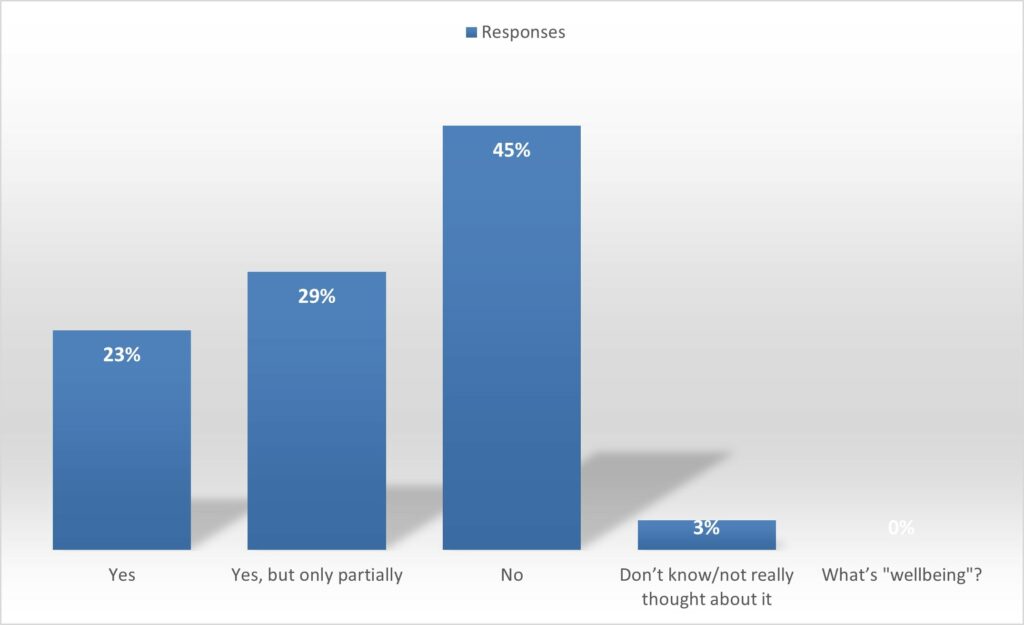
Worrying 45% of survey respondents feel that their immediate manager is not suitably skilled to identify and deal with employee well-being issues. This is up 2% from last year. And another 29% feel that their managers are only partially skilled. Thus, potentially three-quarters of line managers aren’t suitably equipped to identify and deal with employee well-being in ITSM issues (or at least haven’t been able to demonstrate these capabilities to their staff).
45% of @ITSM_tools survey respondents feel that their immediate manager is not suitably skilled to identify and deal with employee #wellbeing issues. #ITSM Click To TweetAgain, further analysis will be conducted to see how this question correlates to the other questions.
Q7. Does your organization have suitable mechanisms for preventing and helping with employee well-being issues?
The results are shown in the graph below.
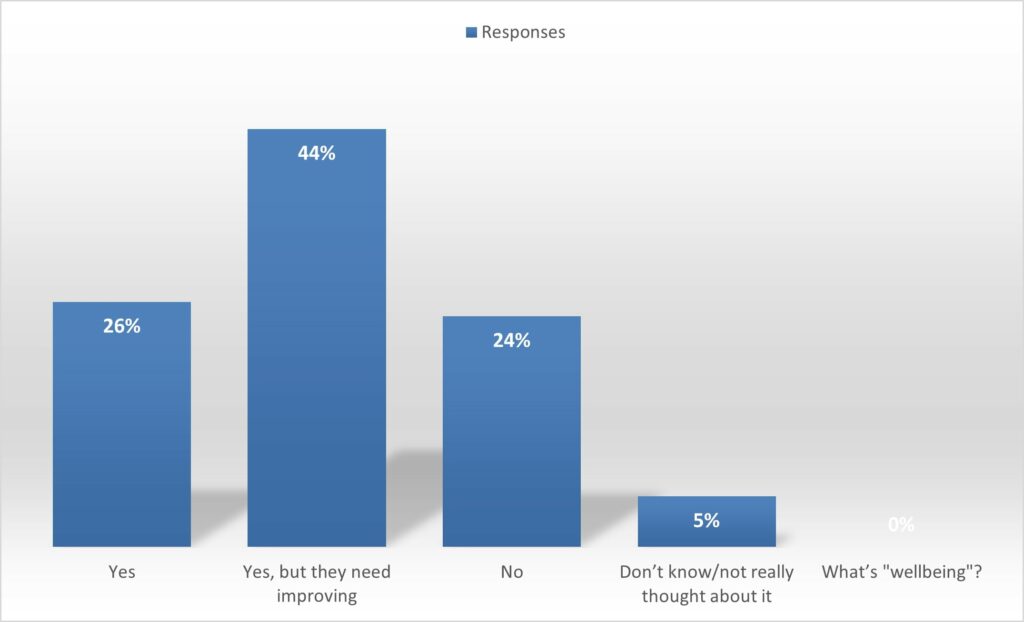
Two things jump out from this data set. First, the respondents who don’t think that their organizations have suitable mechanisms for preventing and helping with employee well-being issues has dropped from 37% to 24% since 2019. Albeit with this positive change in the main moving votes from “No” to “Yes, but they need improving” rather than a full “Yes.” And this is still just over two-thirds of organizations with a need to improve in this area.
Second, there’s now a stark contrast between the faith in organizational and managerial well-being-related capabilities. Where while only 24% of respondents see their organization “failing” in respect of well-being in ITSM, the score is a significantly higher 45% for immediate managers.
Q8. If you worked at home during the COVID-19 crisis, how did you find it?
This might seem like a strange question to ask, but it had a purpose. It was added to help us to better understand well-being in the context of working in a different environment. Such that the impact of homeworking can be hopefully understood relative to the other questions. The results are shown in the graph below.
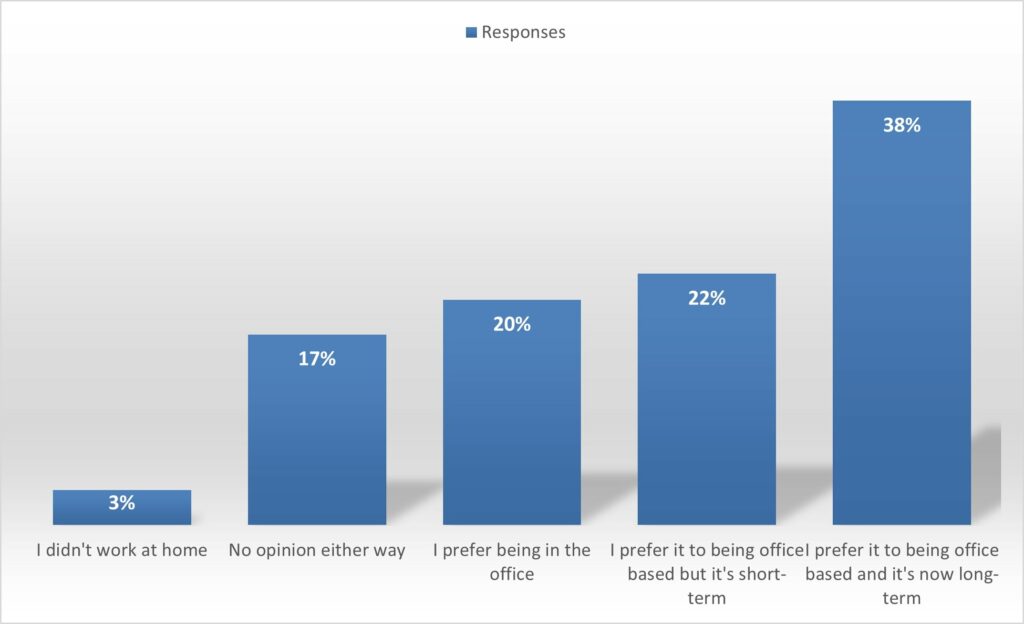
Only 3% of survey respondents didn’t work at home during the COVID-19 crisis – although this doesn’t necessarily mean that these people were working in an office. Of the remainder:
- 20% of survey respondents prefer working in the office
- 60% prefer working at home
- 17% have no preference between office and home-based working.
Of the respondents who worked from home, just over a third of these needed, or need to, return to office-based working.
My follow-up article will dig deeper into how employees’ like or dislike of homeworking influences their views of their well-being in ITSM. Of course, it’ll likely depend on the individual. Especially when factors such as the ability to work effectively at home (which is determined by both the employer and the home), avoided commutes, increased family time, and lack of colleague contact are considered in the mix.
What it all means
The honest answer is that it’s hard to say without deeper analysis. Especially when the impact of the COVID-19 crisis is brought into the equation. Where, while it initially looked as though well-being issues were lower in 2020 – which of course could be due to it being a significantly different sample to 2019’s survey – the COVID-related questions then open up a new “can of worms.”
However, even with the uplift in the earlier questions, the IT industry still looks to have serious issues with employee well-being. Issues that have been amplified by the pressures and uncertainty of the global pandemic. This is made worse by our individual (manager) and collective (organizational) abilities to handle well-being-related issues (either for individuals or teams).
Even with some improvements on our 2019 results, the IT industry still looks to have serious issues with employee well-being says @StephenMann, according to new @ITSM_tools data. #ITSM #wellbeing Click To TweetSomething has to give here. I stand by what I said last year, that “…we all deserve to be happy in our work.” And, from a hard-nosed corporate perspective, well-being issues (and I’m not saying that employee unhappiness is not a corporate issue) are harmful – likely causing adverse sickness, retention, and productivity levels and the effect these have on business performance.
My additional analysis related to the correlations between the different questions will hopefully shine more light on what’s happening and what can be done to improve things – this well-being article is now available here. However, the inability of immediate managers to identify and deal with well-being issues is a serious cause for concern that can’t continue. And this issue is despite what look to be improvements in organizational capabilities between the 2019 and 2020 surveys.
I live in hope that organizations will finally take the issue of well-being seriously. Hopefully, because it’s the right thing to do for its people rather than because it’s something it needs to do based on years of “neglect” and the adverse impact it’s finally having on corporate performance.
What do you make of these survey results? Are we, as an industry, doing enough to address these issues? Please let me know in the comments.
Stephen Mann
Principal Analyst and Content Director at the ITSM-focused industry analyst firm ITSM.tools. Also an independent IT and IT service management marketing content creator, and a frequent blogger, writer, and presenter on the challenges and opportunities for IT service management professionals.
Previously held positions in IT research and analysis (at IT industry analyst firms Ovum and Forrester and the UK Post Office), IT service management consultancy, enterprise IT service desk and IT service management, IT asset management, innovation and creativity facilitation, project management, finance consultancy, internal audit, and product marketing for a SaaS IT service management technology vendor.

